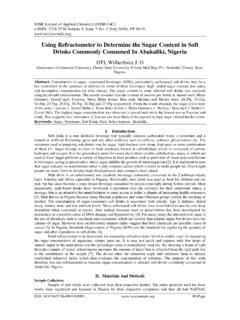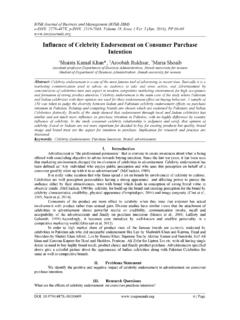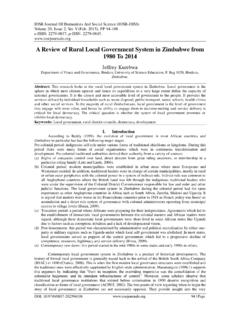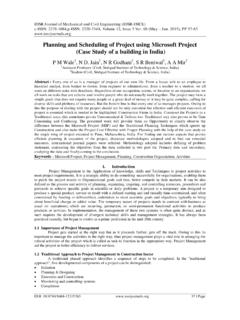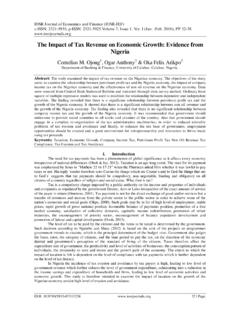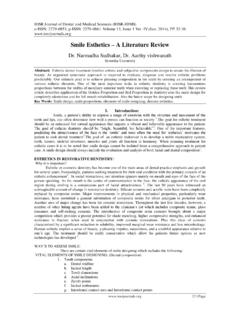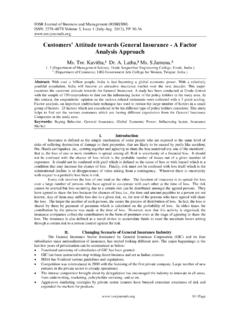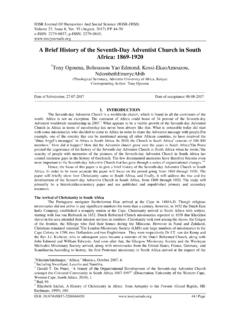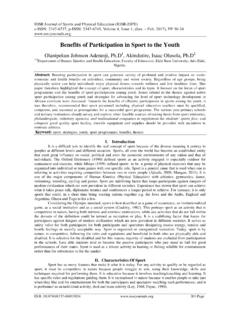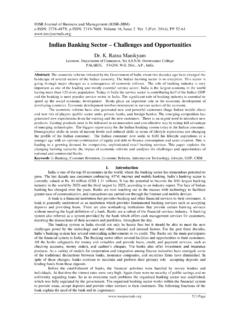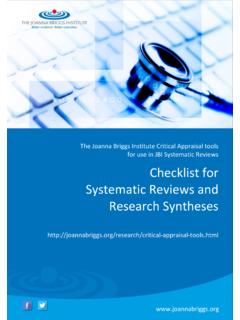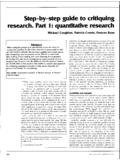Transcription of Effectiveness of performance appraisal on performance of ...
1 IOSR Journal of Business and Management (IOSR-JBM) e-ISSN: 2278-487X, p-ISSN: 2319-7668. Volume 16, Issue 6. Ver. II (Jun. 2014), PP 173-178 173 | Page Effectiveness of performance appraisal on performance of employees Muhammad Zohaib Abbas I. INTRODUCTION performance appraisal is often regarded as the most critical function of human resource management (Selvarajan and Cloninger, 2008; Smither and London, 2009). Several prior studies have revealed that suggested that effective performance appraisal system is the sign of integral component of Effectiveness of human resource management of an organization (Zapata-Phelan et al., 2009). performance appraisal has been studied widely in several organizations in the western context. However, this particular topic has not been researched appropriately in the Asian context specifically in perspective of Pakistan. Selvarajan and Cloninger (2009) have also noted that performance appraisal is not effectively developed process within Pakistani organizations, but the evidence and prior literature on this topic is rare.
2 Moreover, the prior literature on this subject aims at observational aspects and little emphasis is made on the empirical findings of the Effectiveness of performance appraisal and its influence on employee performance (Selvarajan and Cloninger 2008). Clearly, there is need to derive empirical findings on evaluation on Effectiveness of performance appraisal system and its influence on employee performance in the context of Pakistan. DeNisi and Pritchard (2006) have also noted that extant research on performance appraisal has excessively emphasized on psychometric issues rather than focusing on rigorous and systematic approach to performance appraisal that is more likely to enhance motivation level of employees for improving their performance . Roberson and Stewart (2006) found that employees respond to performance appraisal system in three perspectives that are: a) perception of fairness, b) perception of accuracy, and c) performance appraisal satisfaction.
3 On the other hand, Selvarajan and Cloninger (2009) were of the view that performance appraisal provides consistent feedback to employees that enables them to improve performance . Thus, a critical issue in this regard is to assess and determine the factors that can influence outcomes of performance appraisal . In this respect, the current study aimed at the evaluation of critical factors associated with the Effectiveness of performance appraisal system in Pakistan. II. Originality of research This paper has contributed to elaborate that how Pakistani organizations pursue performance appraisal system. In this way, gap in literature has been filled regarding performance appraisal in Pakistani organizations. The results of this study are based on the survey findings conducted with employees of several organizations. In this way, empirical contributions have been made by the researcher to elaborate Effectiveness of performance appraisal system and its impact on performance of employees.
4 Objectives The purpose of the study is to understand Effectiveness of performance appraisal in the Pakistani organizations. Specifically, factors influencing performance appraisal have been identified in the study. Furthermore, this study also aimed to elaborate the influence of appraisal on employee performance in Pakistani organizations. Finally, critical challenges involved in the performance appraisal system will also be evaluated appropriately. III. Literature Review Employee performance appraisal is an effective tool or vehicle for assessment of employee performance and implementation of strategic initiatives for the improvement of employee performance (Lawler and McDermott, 2003). However, a considerable literature stream also suggests that there exist dissatisfaction in employees regarding performance appraisal system (Mercer, 2002; Roberson and Stewart, 2006; Moullakis, 2005). For instance, Morgan (2006) noticed that performance appraisal in many organizations has not met expectations of employees.
5 In the same vein, prior findings by Smither and London (2009) have elucidated that 80-90% managers reflect that performance appraisal has not been effective in improving employee and organization s performance . performance appraisal has been regarded as the most critical human resource function within organizations by which assessors or supervisors analyse and assess performance of their subordinates (Keeping Effectiveness of performance appraisal on performance of employees 174 | Page and Levy, 2000). the outcomes of performance appraisal assists mangers to select specific pay rates, promotional decisions, development and training needs and motivational factors for employees (Zapata-Phelan et al., 2009). In this regard, performance appraisal system has been widely researched within organizational psychology to assess employee performance . However, despite of resources applied and attention made to this particular topic, prior researchers have found continuing dissatisfaction among employers and employees about outcomes of performance appraisal systems in terms of unfair, inaccurate and political outcomes (Rao, 2004; DeNisi and Pritchard, 2006).
6 Therefore, it is important to study the factors affecting outcomes of performance appraisal system. Literature has identified several indicators that affect the outcomes of performance appraisal system. In this regard, one critical factor is the appraisal source. This factor suggests that employee performance can be evaluated through multiple sources such as supervisors, managers, self, peers and even customers (Wood and Marshall, 2008). Another important characteristic of performance appraisal is the purpose for which performance has been appraised or evaluated (Thurston, 2001), and typically, performance appraisal systems are utilized for multiple purposes ranging from developmental and administrative purposes. Feedback richness is also an effective indicator that may affect the outcomes of performance appraisal . Feedback richness elaborates the specific appraisal environment by which frequent, specific and timely feedback is provided by employees to employers regarding job (Kinicki et al.)
7 , 2004). Perceived accuracy of performance appraisal has been regarded as an important aspect to evaluate the satisfaction and motivation in employees in relation to performance appraisal (Wood and Marshall, 2008; and Selvarajan and Cloninger, 2009). In this regard, prior studies suggest that if employee perceive that appraisal outcomes are accurate, they are more likely to recognize these results and act on them (Roberson and Stewart, 2006). On the other hand, employee perception of fairness also measures Effectiveness of performance appraisal outcomes (Youngcourt et al., 2007). In this respect, previous studies have suggested that justice or fairness of performance appraisal can be evaluated into three dimensions. These are distributive, interactional fairness and procedural (Colquitt et al. 2001). In this regard, distributive fairness represents the extent to which outcomes of appraisal are distributed fairly (Smither and London 2009).
8 In the appraisal context, the distributive context relates with the ratings of performance appraisal gained by employees. On the other hand, procedural fairness aims at the extent to which procedures deployed by organization for appraisal are fair in deriving outcomes of appraisal (Zapata-Phelan et al., 2009). Contrary to this, the concept of interactional fairness represents the extent to which employees receive treatment of peers and supervisors during the process of appraising performance (Roberson and Stewart 2006). Prior studies about meta-analysis of performance appraisal and perceptions of justice suggest that it enhances performance and satisfaction of employees (Roberson and Stewart 2006). On the contrary, appraisal satisfaction represents the contentment of employees with the results of appraisal system. Levy and Williams (2004) suggest that analyzing employee satisfaction is important as it determines reactions of employees towards appraisal .
9 Contrary to this, motivation represents the degree to which employees are willing to make improvements in their performance (Roberson and Stewart, 2006). Some authors suggest that perceptions about fairness hold a critical importance within organizations because it avoids negative outcomes such as disruptive behaviors and employee turnover and also enhance positive outcomes of organizations such positive citizenship, commitment and satisfaction with the job (Selvarajan and Cloninger, 2009). Thurston (2001) has addressed the specific aspects related with performance appraisal and also reveal that Effectiveness and success of appraisal system depends on reactions and feedback of employees. This suggests that employee feedback is critical factor in assessing Effectiveness of appraisal system. This feedback can be positive or negative regarding outcomes of appraisal system. Prior studies have revealed that positive feedback is more likely to be accepted whereas employees often hesitate to accept negative outcomes of appraisal system (Rao 2004).
10 On the other hand, Roberson and Stewart (2006) suggest that if negative feedback is delivered in an effective and persuasive manner, employees will take it seriously and will focus on eliminating the negative aspects in their performance . Prior literature has suggested that performance appraisal is an effective system for attaining different objectives. In this regard, Selvarajan and Cloninger (2009) have revealed that effective performance appraisal system results in improving performance of employees and motivating them. In this regard, it can be identified who are the weak performers and who strong performers within organizations are. In the same line of thought, prior studies have identified five major outcomes of effective performance appraisal (Rao 2004). These are: 1) using results of performance appraisal to improve employee performance , 2) enhancing motivation, 3) reducing employee turnover, 4) associating rewards and employee performance and 5) establishing equity among employees (Rao 2004; Selvarajan and Cloninger, 2009).
